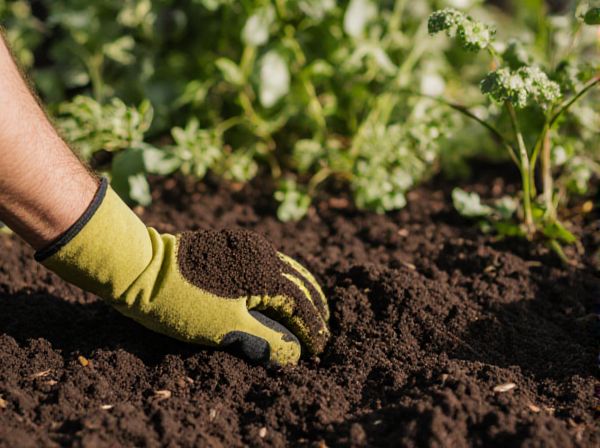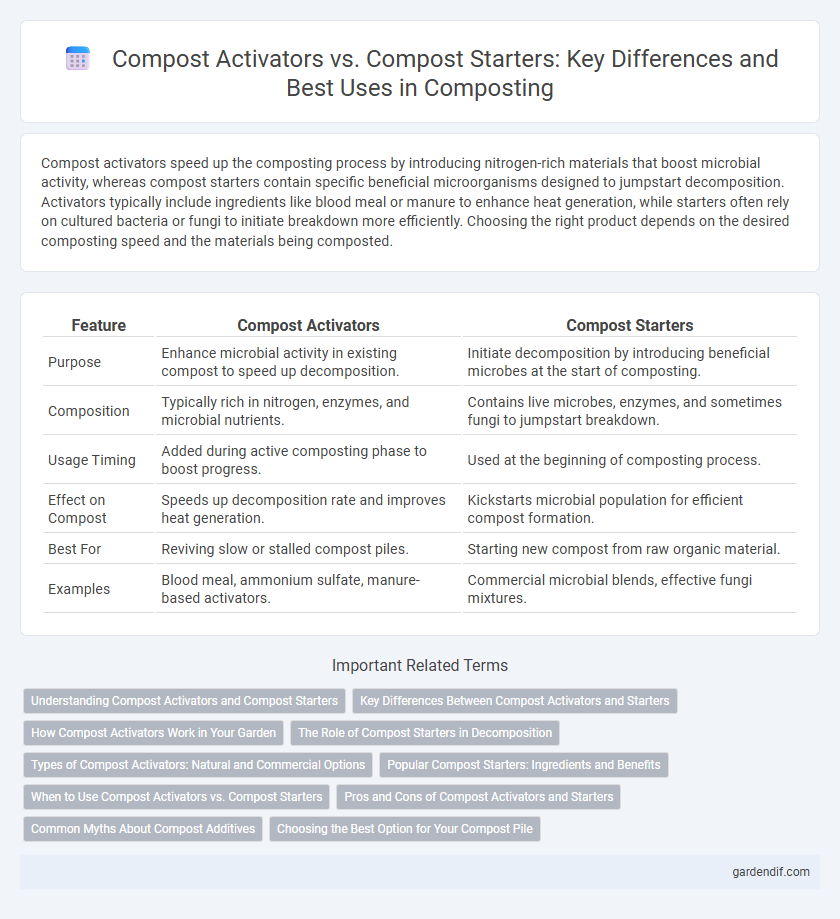
Compost activators vs Compost starters Illustration
Compost activators speed up the composting process by introducing nitrogen-rich materials that boost microbial activity, whereas compost starters contain specific beneficial microorganisms designed to jumpstart decomposition. Activators typically include ingredients like blood meal or manure to enhance heat generation, while starters often rely on cultured bacteria or fungi to initiate breakdown more efficiently. Choosing the right product depends on the desired composting speed and the materials being composted.
Table of Comparison
| Feature | Compost Activators | Compost Starters |
|---|---|---|
| Purpose | Enhance microbial activity in existing compost to speed up decomposition. | Initiate decomposition by introducing beneficial microbes at the start of composting. |
| Composition | Typically rich in nitrogen, enzymes, and microbial nutrients. | Contains live microbes, enzymes, and sometimes fungi to jumpstart breakdown. |
| Usage Timing | Added during active composting phase to boost progress. | Used at the beginning of composting process. |
| Effect on Compost | Speeds up decomposition rate and improves heat generation. | Kickstarts microbial population for efficient compost formation. |
| Best For | Reviving slow or stalled compost piles. | Starting new compost from raw organic material. |
| Examples | Blood meal, ammonium sulfate, manure-based activators. | Commercial microbial blends, effective fungi mixtures. |
Understanding Compost Activators and Compost Starters
Compost activators contain specific nutrients and microorganisms that speed up the decomposition process by enhancing microbial activity, while compost starters primarily introduce beneficial microbes to initiate composting. Activators often include nitrogen-rich materials like blood meal or alfalfa meal to boost microbial growth, whereas starters focus on seeding the compost pile with effective bacteria and fungi. Understanding the roles of both ensures efficient composting by balancing nutrient supply and microbial presence for optimal organic matter breakdown.
Key Differences Between Compost Activators and Starters
Compost activators boost microbial activity and speed up the decomposition process by adding nitrogen-rich materials, enzymes, or microorganisms, whereas compost starters primarily introduce beneficial microbes to initiate composting. Activators often contain substances like blood meal or alfalfa meal to enhance microbial metabolism, while starters typically consist of microbial cultures or finished compost to seed the pile. Understanding these differences helps optimize composting efficiency by selecting the appropriate product based on the compost pile's current microbial activity and nutrient needs.
How Compost Activators Work in Your Garden
Compost activators accelerate the decomposition process by introducing essential microorganisms and nutrients that boost microbial activity in your compost pile. These activators enhance the breakdown of organic matter, resulting in faster nutrient release and richer, healthier soil for your garden plants. Using compost activators helps maintain optimal temperature and moisture levels, ensuring efficient composting and improved soil fertility.
The Role of Compost Starters in Decomposition
Compost starters accelerate the decomposition process by introducing a concentrated mix of microorganisms that break down organic matter more efficiently than natural microbial populations alone. These starters contain beneficial bacteria and fungi that optimize the initial stages of composting, reducing the time needed to transform waste into nutrient-rich humus. Effective use of compost starters enhances microbial activity, improving aeration, moisture retention, and temperature regulation within the compost pile.
Types of Compost Activators: Natural and Commercial Options
Compost activators enhance microbial activity to accelerate organic matter decomposition, available in natural forms like manure, alfalfa meal, and green plant materials, which provide essential nitrogen and nutrients. Commercial compost activators contain balanced microbial cultures, enzymes, and nutrients formulated to optimize the composting process and reduce odors. Selecting between natural and commercial activators depends on compost goals, availability, and desired processing speed for efficient organic waste breakdown.
Popular Compost Starters: Ingredients and Benefits
Popular compost starters often contain microorganisms like bacteria and fungi, enzymes, and nutrients such as nitrogen, phosphorus, and potassium that accelerate the decomposition process. These ingredients enhance microbial activity, boost temperature, and improve nutrient availability in the compost pile, resulting in faster breakdown of organic materials. Using compost starters leads to richer, nutrient-dense compost that supports healthier plant growth and soil fertility.
When to Use Compost Activators vs. Compost Starters
Compost activators are best used when the compost pile lacks heat and microbial activity, accelerating decomposition by adding nitrogen-rich materials like manure or blood meal. Compost starters are most effective at the initial stage of composting to introduce beneficial microbes that jumpstart the breakdown of organic matter. For ongoing compost maintenance, activators help sustain microbial populations and temperature, while starters primarily trigger the composting process at the beginning.
Pros and Cons of Compost Activators and Starters
Compost activators speed up decomposition by increasing microbial activity, making them ideal for jump-starting compost piles; however, they can be costly and sometimes require precise application to avoid imbalances. Compost starters introduce specific microbes or enzymes to initiate the composting process efficiently but may take longer to show results and depend heavily on the quality and composition of the starting materials. Both options enhance composting, yet activators excel in rapid action while starters favor gradual, controlled breakdown, influencing the choice based on time and resource availability.
Common Myths About Compost Additives
Compost activators and compost starters are often misunderstood as essential additives for a successful compost pile, but many common myths exaggerate their necessity. Compost starters mainly contain microbes and enzymes that aim to speed up decomposition, while activators enrich the pile with nutrients like nitrogen or phosphate to boost microbial activity. In reality, well-balanced organic materials and proper maintenance usually suffice for effective composting, making these additives optional rather than mandatory for healthy compost production.
Choosing the Best Option for Your Compost Pile
Compost activators contain nitrogen-rich materials that accelerate microbial activity and heat production, ideal for jumpstarting a compost pile. Compost starters often include specific strains of microbes or enzymes designed to initiate decomposition but may act slower than activators. Selecting between activators and starters depends on your composting goals, material types, and desired timeline for finished compost.
Compost activators vs Compost starters Infographic

 gardendif.com
gardendif.com